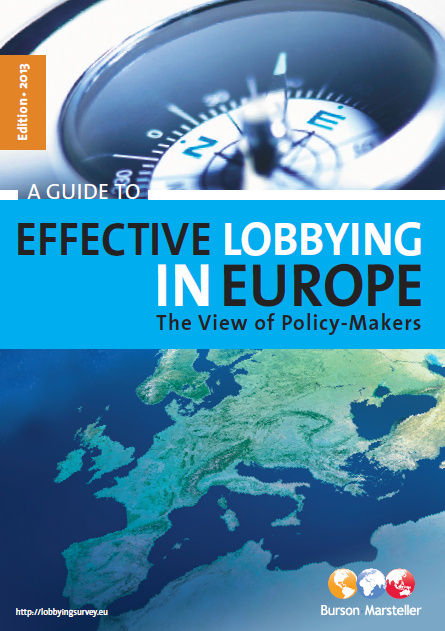
Burson-Marsteller and Chapter 4 today released its fifth survey on effective lobbying in Europe, revealing interesting differences in the attitudes of politicians and senior officials from the EU institutions and 19 European countries on such topics as who are good or bad lobbyists, the need for more regulation of lobbying and the utility of social media as a channel of influence.
Nearly 9 out of 10 of respondents either agreed or strongly agreed with the statement that “ethical and transparent lobbying helps policy development” and most groups of lobbyists were generally perceived as being transparent, most notably trade associations, professional organisations, companies, trade unions and NGOs. These five groups were among those most commonly perceived as lobbyists; the other group generally thought of as lobbyists - public affairs agencies - were seen as less transparent.
Other key findings are:
- More than half of the respondents (53%) thought that a mandatory register for lobbyists would be useful in their country
- Trade associations were perceived as the most effective lobbyists (62%), followed by professional organisations and NGOs
- The least transparent lobbyists are journalists (41%) and law firms (38%)
- Almost half of the respondents never use Twitter for work and only a fifth use Facebook daily for work
- Social media (47%) and traditional media, including media websites (both 26%), appear to be seen as not particularly helpful
- The majority (56%) of respondents across Europe think that lobbying is not sufficiently regulated in their country
- Policy-makers often consult company websites (43%) using them daily or at least once a week, industry association websites (41%), NGO websites (37%) and Wikipedia (38%)
- Corporate lobbyists in the energy (68%) and healthcare (60%) sectors were seen to be the most effective and the most effective NGO lobbyists were seen to be working in the environment (52%) and human rights (49%) fields.
- Both corporate and NGO lobbyists were seen to be least effective in the retail (13%) and consumer goods (15%) areas.
- 48% of respondents thought that NGOs are not being sufficiently transparent about the interest they represent and 56% also thought NGOs based their position on emotion rather than facts
For more information, you can visit: http://lobbyingsurvey.burson-marsteller.eu/.